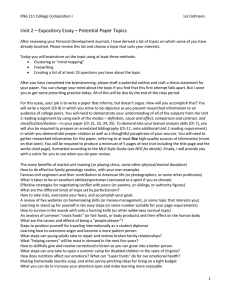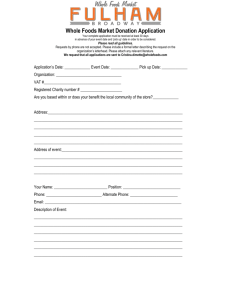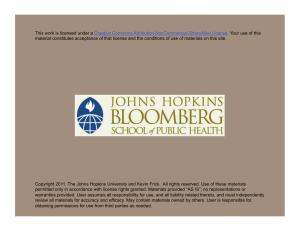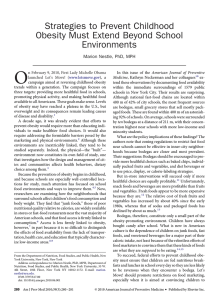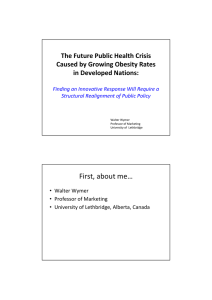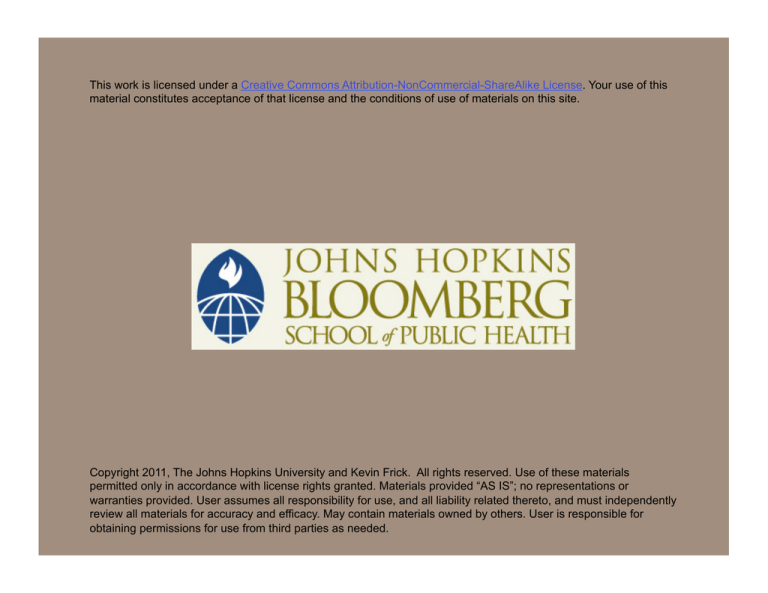
This work is licensed under a Creative Commons Attribution-NonCommercial-ShareAlike License. Your use of this
material constitutes acceptance of that license and the conditions of use of materials on this site.
Copyright 2011, The Johns Hopkins University and Kevin Frick. All rights reserved. Use of these materials
permitted only in accordance with license rights granted. Materials provided “AS IS”; no representations or
warranties provided. User assumes all responsibility for use, and all liability related thereto, and must independently
review all materials for accuracy and efficacy. May contain materials owned by others. User is responsible for
obtaining permissions for use from third parties as needed.
Role of Government and Potential Policies
Kevin Frick, PhD
Johns Hopkins University
Section A
Motivation for Government Policy
Acknowledgement
Many of the principles outlined in this lecture are derived from the
work of Eric A. Finkelstein and Laurie Zuckerman, authors of The
Fattening of America.
4
Why Have Prices of Less Healthy Foods Gone Down?
Why have relative prices of less healthy foods gone down?
- Government funded research
-
-
-
Innovations in food processing, preservation, and cooking
Foods more dependent on technology often have highest
amounts of added fat and sugar
Food innovations not only make the foods cheaper but also make
them take less time to prepare
Less money and less time
5
Overriding Questions
What has gone on in the market?
What has government done?
What is the rationale for government action?
6
Farm Subsidies
The federal government has subsidized production of goods like corn
and soybeans
-
Farmers produce more of these and less of other agricultural
products
Makes corn and soy (and all byproducts) cheaper and
makes other goods more expensive
7
Rationale for Government Role—Equity
Is there an income-based equity issue?
- In other words, we could argue about food availability
differences by income status that would prompt public policy
However, the need for some type of intervention to avoid obesity is
common at all income levels
-
This does not mean that it may not be important to intervene—
simply that a lack of equity is not a reason to intervene
8
Rationale for Government Role—Irrationality
Psychology and advertising play a role
The question is whether that should matter when adults have (and
are expected to make) choices
-
There are advertisements for all sorts of goods and services that
are not highly regulated
Difficult to argue for irrationality of decisions by adults
- Again, we can start to think about David Kessler’s work and just
how well people understand what is in their food and how it
influences their behavior
9
Rationale for Government Role—Public Need
Need is defined by health professionals
Consumers have demand
-
Does not always match need
Need-based intervention rather than a demand-based intervention is
unlikely to work
Have to define the need—what is needed and why?
10
Role of Government
Externalities
- Side effects of a market that spill over into society at large
Pollution and infectious disease prevention
Market power
Public goods
Imperfect information
11
Externalities
Airline seats
- Can be solved in private market by requiring an obese person to
purchase two tickets
Difficulty of dealing with an obese patient
- Can be solved in private market by increasing wages of health
care workers to compensate
Obesity in pregnancy
- No easy way to compensate the unborn child
Given our health care financing system we could argue there is a
financial externality
12
Market Power
Market power generally leads to higher prices
Food prices have been decreasing
Therefore, there is no evidence that this is an issue in the markets
that determine the prevalence of obesity
13
Public Goods
Non-excludable and non-rival
- Non-excludable: no one can be prevented from using it once it
is made available, even if an individual is not willing to pay
-
Non-rival: if one person uses it others can still use it—like a
lighthouse
Often underprovided by private markets
Food itself is certainly not a public good
Governments already provide a lot of public goods and information
related to obesity
-
Is there a need for more public goods related to health and
nutrition?
14
Asymmetric Information
If sellers have more information than buyers, that can disadvantage
the buyers
-
-
-
Many sellers of foods provide information
-
Again, we can bring David Kessler’s work in and think about how
much food scientists have figured out ways to produce foods
that bring about responses that are neither anticipated nor
understood by consumers
Many consumers do not seem to use information
Even without legislation against trans-fats many producers were
phasing them out
15
Is There a Role for Government?
With respect to kids who are not making their choices on their own
- Key question is whether this is a governmental role or a parental
role
16



